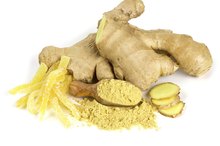Are There Herbs That Dissolve Intestinal Mucus?
Intestinal mucus is a thick, slimy substance produced in the mucous membranes of your colon, or large intestine. It helps protect your intestinal walls against pathogens and damage from food and wastes that pass through your digestive tract. Too much mucus can mean your membranes are inflamed due to a gastrointestinal disease, such as ulcerative colitis, irritable bowel syndrome, diarrhea or a bacterial infection. Herbs may help dissolve intestinal mucus naturally. Consult your health care provider before starting herbal treatment.
Herbal Actions
Herbs that dissolve intestinal mucus work by breaking down the thick viscous material, shrinking mucous membrane tissue and reducing inflammation that triggers excess mucus production. It is important to see your doctor and treat any underlying disorder, since once the infection or disease is under control, excess mucus will more easily dissolve and pass through your system. Check with a qualified practitioner for advice about dosage and preparation of herbs to dissolve intestinal mucus.
Bayberry
Herbal Treatment for Internal Bleeding
Learn More
Bayberry, or Myrica cerifera, is an evergreen tree with yellow flowers and waxy berries. Herbalists use the root bark to treat mucous colitis, diarrhea and ulcers. The herb is rich in flavonoids and tannins, and has anti-catarrhal and astringent properties. In their 2001 book, “Herbal Remedies,” naturopathic doctors Asa Hershoff and Andrea Rotelli recommend bayberry for diarrhea and state that its astringent action will tighten and dry out excess intestinal mucus. Do not combine this herb with steroid or blood pressure medicine.
Cinnamon
Cinnamon, or Cinnamomum verum, is an evergreen tree native to south Asia. Traditional healers use the inner bark and essential oil to treat a range of illnesses, including digestive problems, diarrhea, rheumatism and inflammatory disorders. In Asian medicine, cinnamon is warming and stimulating, and may help dissolve and move intestinal mucus. Hershoff and Rotelli explain that cinnamon is an intestinal astringent that eliminates excess mucus while warming and toning your digestive system. Do not use this herb if you are pregnant or nursing.
Chamomile
Herbal Remedies for Nasal Polyps
Learn More
Chamomile, or Matricaria recutita, is a European annual herb with white and yellow flowers. It has a long history of treating digestive upsets, skin disorders and inflammation of the mucous membranes. Chamomile counters inflammation and mucus production due to its flavonoids and sesquiterpenes. Its anti-inflammatory action may help reduce the cause and secretion of thick mucus, while its anti-catarrhal action may dissolve excess mucus buildup. In his 2003 book, “Medical Herbalism: The Science and Practice of Herbal Medicine,” clinical herbalist David Hoffmann, FNIMH, AHG, recommends chamomile for ulcerative colitis and inflammatory bowel disease. Do not use this herb if you have allergies to plants in the aster family.
Related Articles
References
- “Herbal Remedies”; Asa Hershoff, N.D., and Andrea Rotelli, N.D.; 2001
- “Medical Herbalism: The Science and Practice of Herbal Medicine”; David Hoffmann; 2003
Writer Bio
Janet Contursi has been a writer and editor for more than 23 years. She has written for professional journals and newspapers, and has experience editing educational, cultural, and business articles and books. Her clients include Gale Publishers, Anaxos, Vielife and Twin Cities Wellness. Contursi earned her Ph.D. at the University of Minnesota, where she studied cultural anthropology, South Asian languages and culture, and art history.









